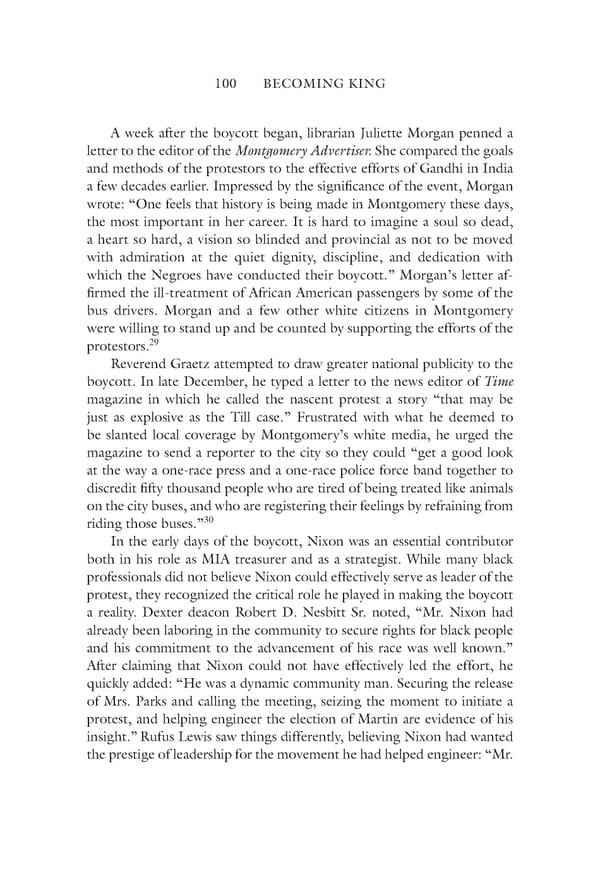100 BECOMING KING A week after the boycott began, librarian Juliette Morgan penned a letter to the editor of the Montgomery Advertiser. She compared the goals and methods of the protestors to the effective efforts of Gandhi in India a few decades earlier. Impressed by the significance of the event, Morgan wrote: “One feels that history is being made in Montgomery these days, the most important in her career. It is hard to imagine a soul so dead, a heart so hard, a vision so blinded and provincial as not to be moved with admiration at the quiet dignity, discipline, and dedication with which the Negroes have conducted their boycott.” Morgan’s letter af- firmed the ill-treatment of African American passengers by some of the bus drivers. Morgan and a few other white citizens in Montgomery were willing to stand up and be counted by supporting the efforts of the 29 protestors. Reverend Graetz attempted to draw greater national publicity to the boycott. In late December, he typed a letter to the news editor of Time magazine in which he called the nascent protest a story “that may be just as explosive as the Till case.” Frustrated with what he deemed to be slanted local coverage by Montgomery’s white media, he urged the magazine to send a reporter to the city so they could “get a good look at the way a one-race press and a one-race police force band together to discredit fifty thousand people who are tired of being treated like animals on the city buses, and who are registering their feelings by refraining from 30 riding those buses.” In the early days of the boycott, Nixon was an essential contributor both in his role as MIA treasurer and as a strategist. While many black professionals did not believe Nixon could effectively serve as leader of the protest, they recognized the critical role he played in making the boycott a reality. Dexter deacon Robert D. Nesbitt Sr. noted, “Mr. Nixon had already been laboring in the community to secure rights for black people and his commitment to the advancement of his race was well known.” After claiming that Nixon could not have effectively led the effort, he quickly added: “He was a dynamic community man. Securing the release of Mrs. Parks and calling the meeting, seizing the moment to initiate a protest, and helping engineer the election of Martin are evidence of his Rufus Lewis saw things differently, believing Nixon had wanted insight.” the prestige of leadership for the movement he had helped engineer: “Mr.
 Becoming King: Martin Luther King Jr. Page 120 Page 122
Becoming King: Martin Luther King Jr. Page 120 Page 122